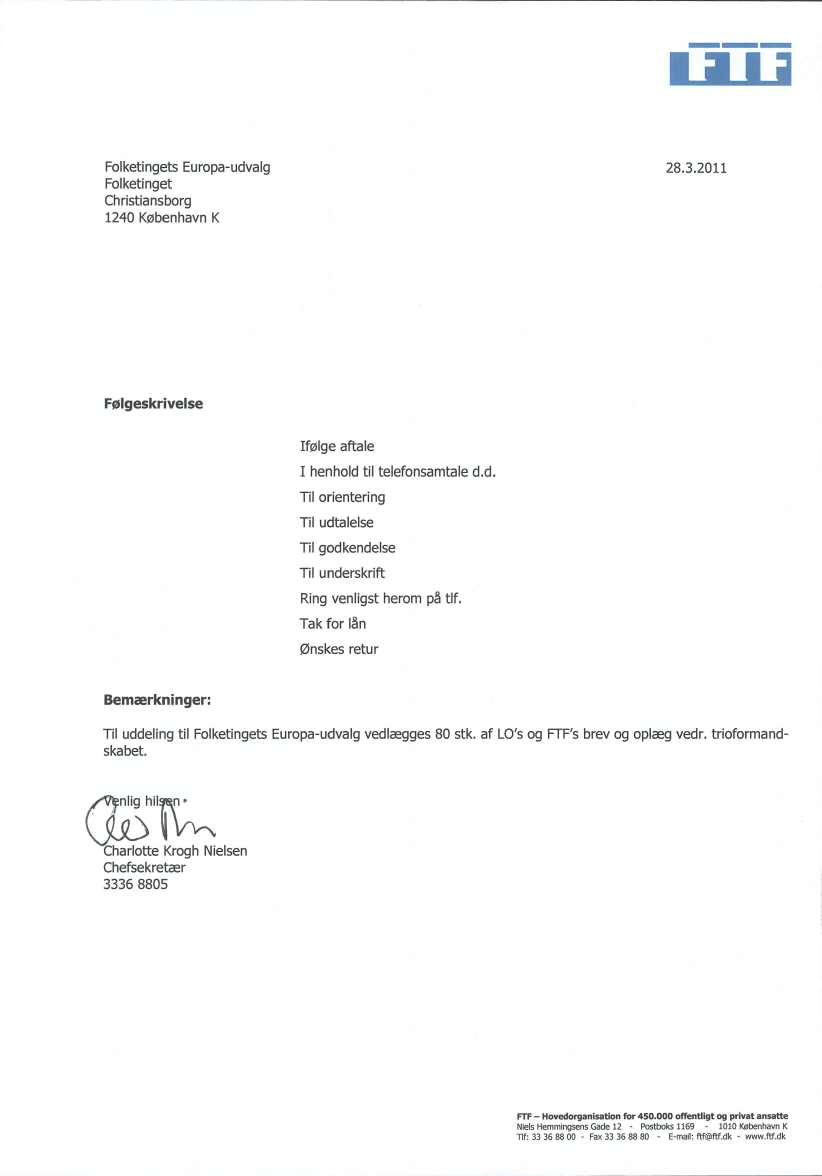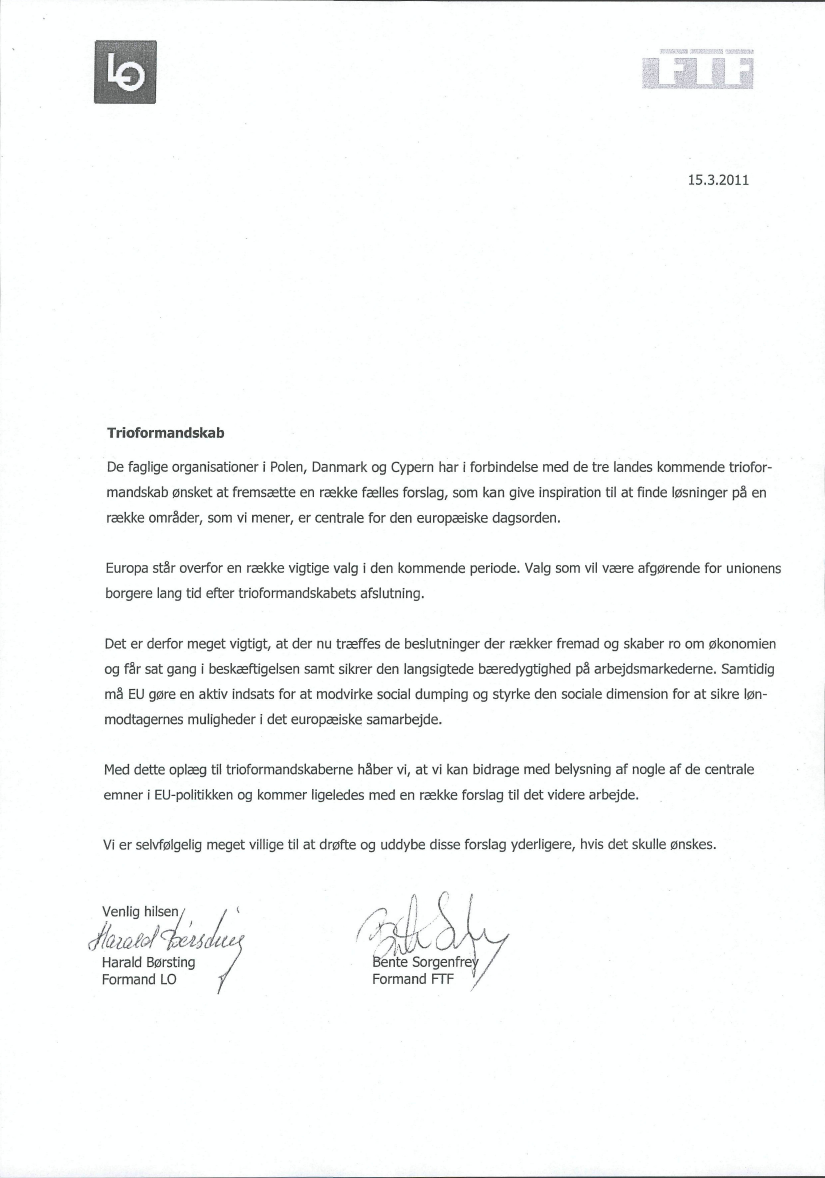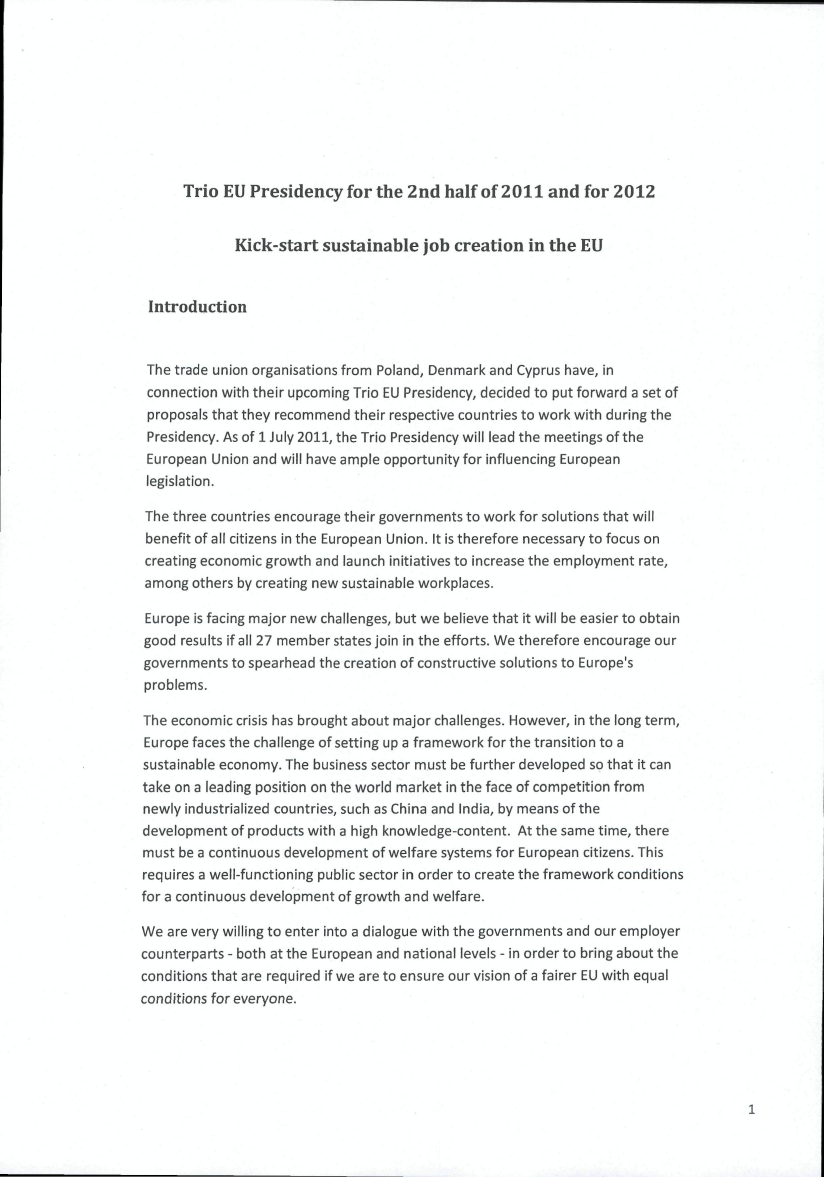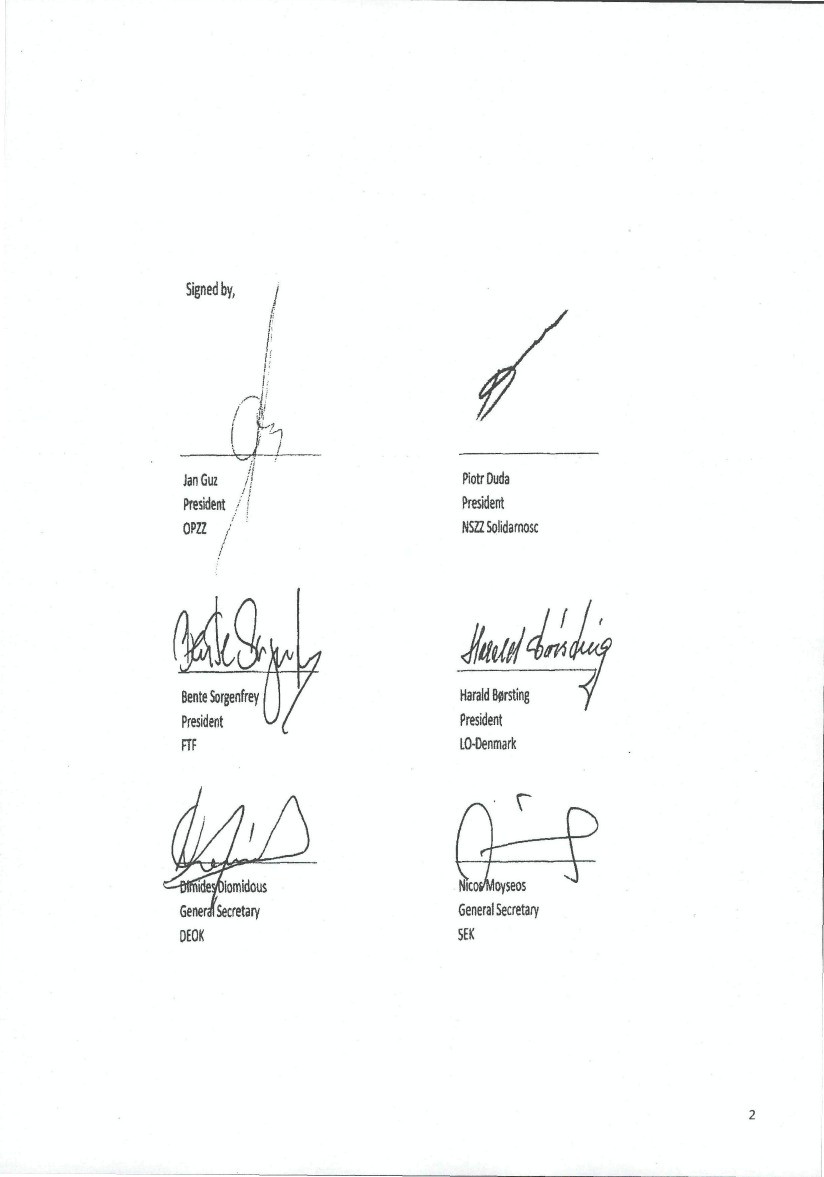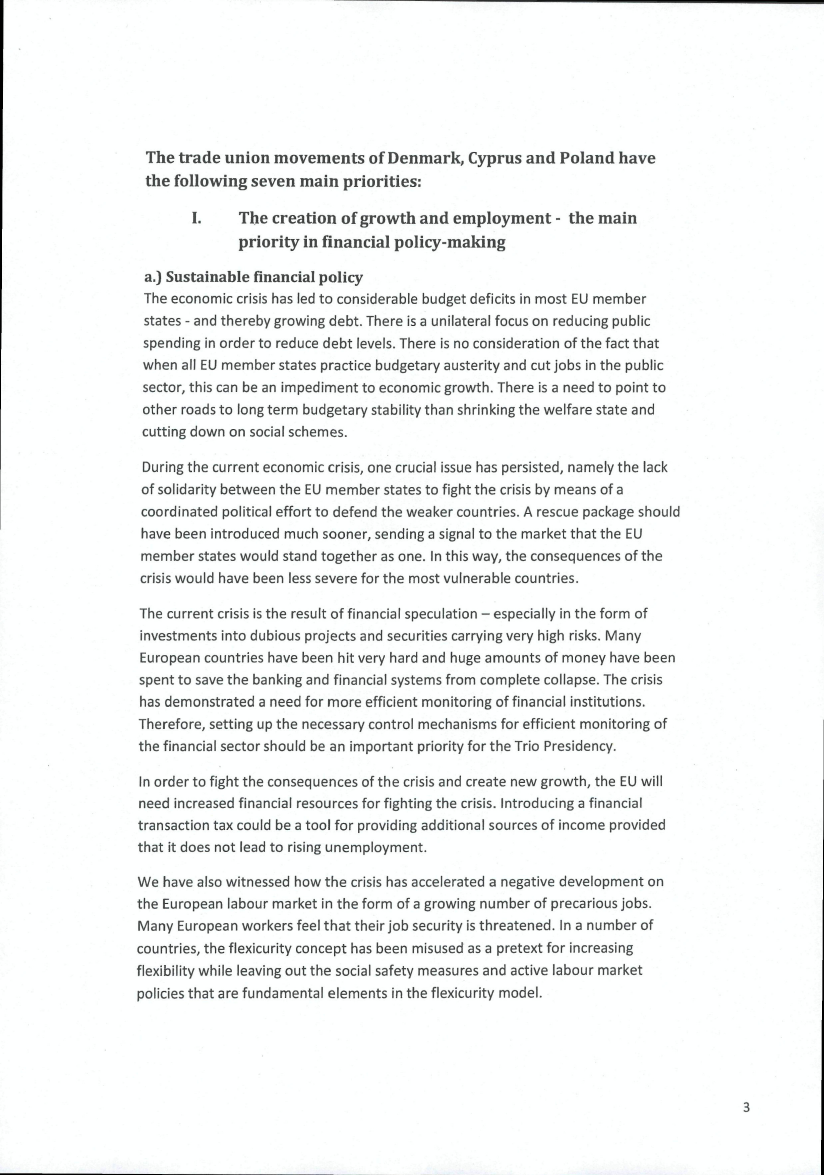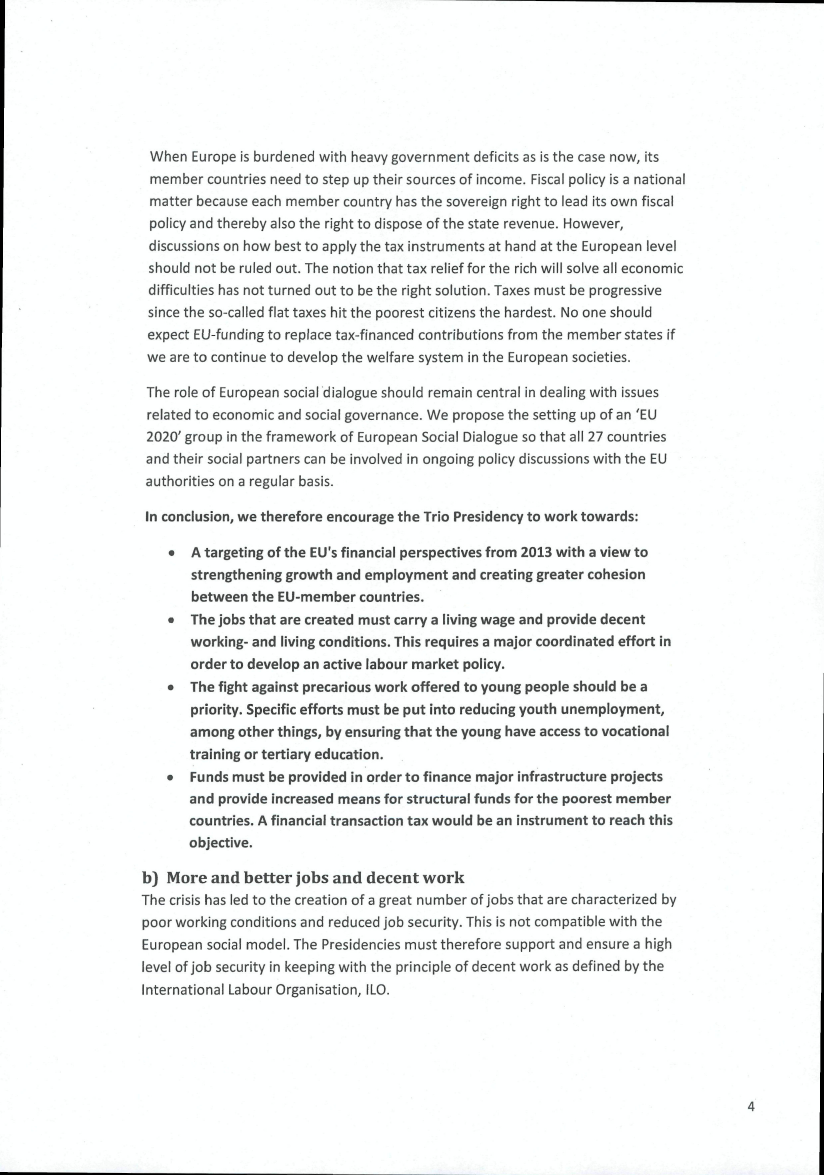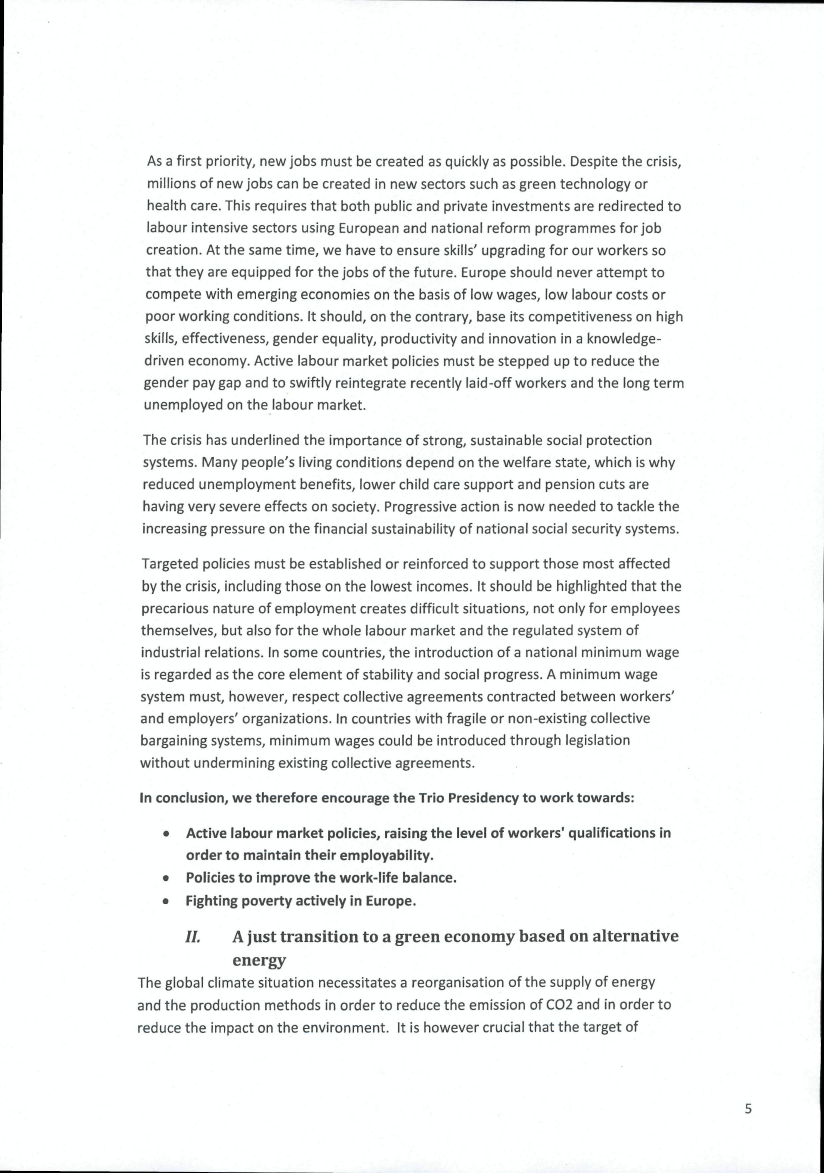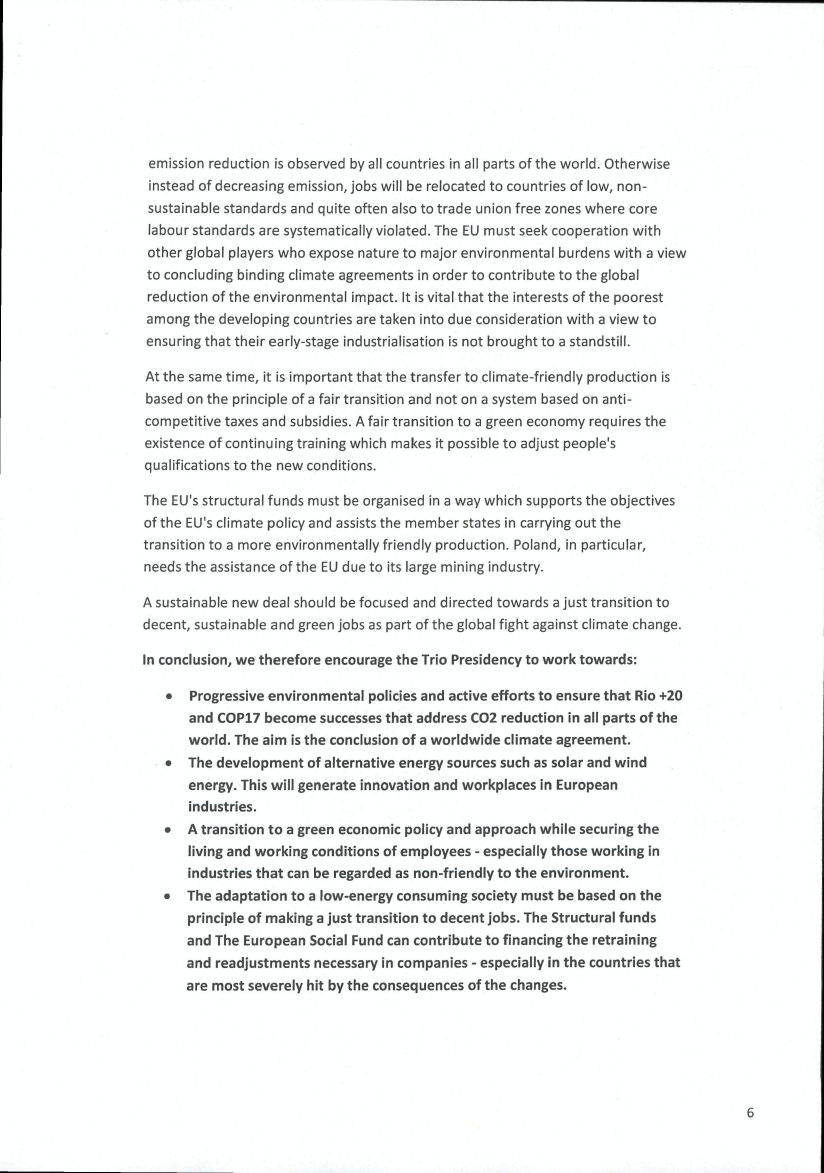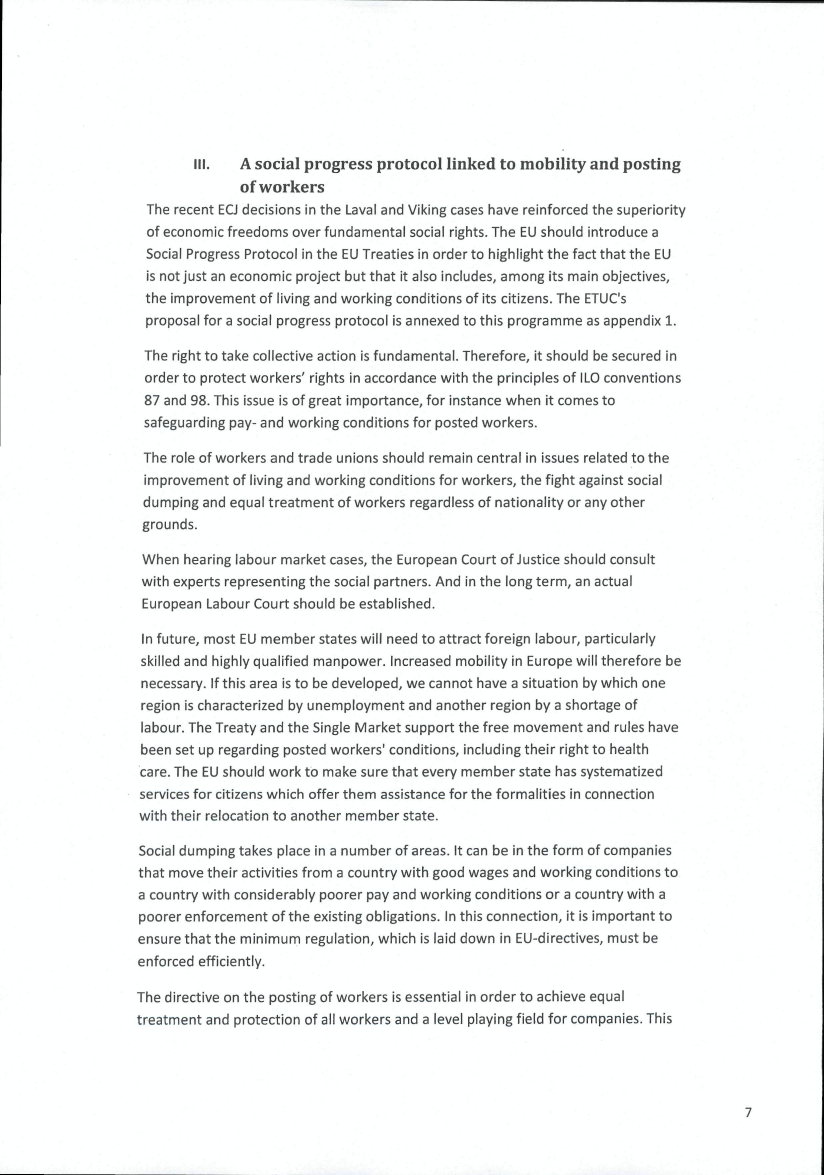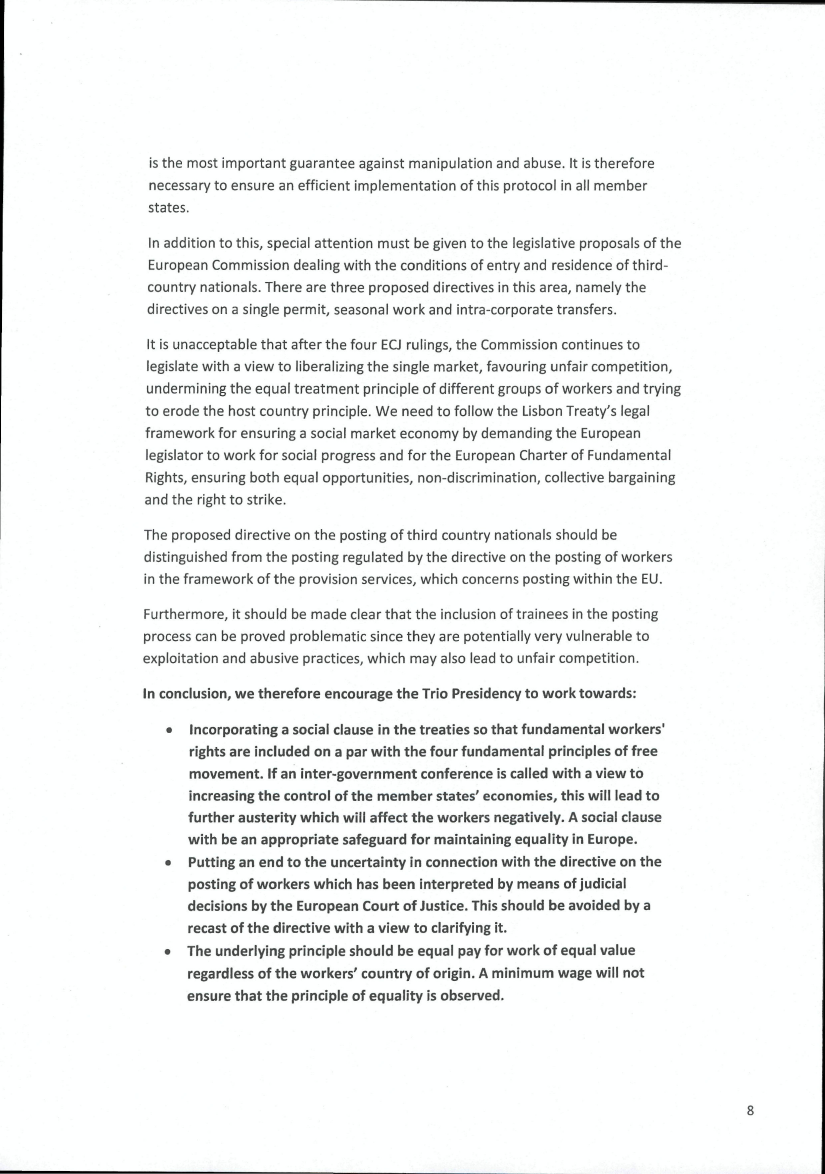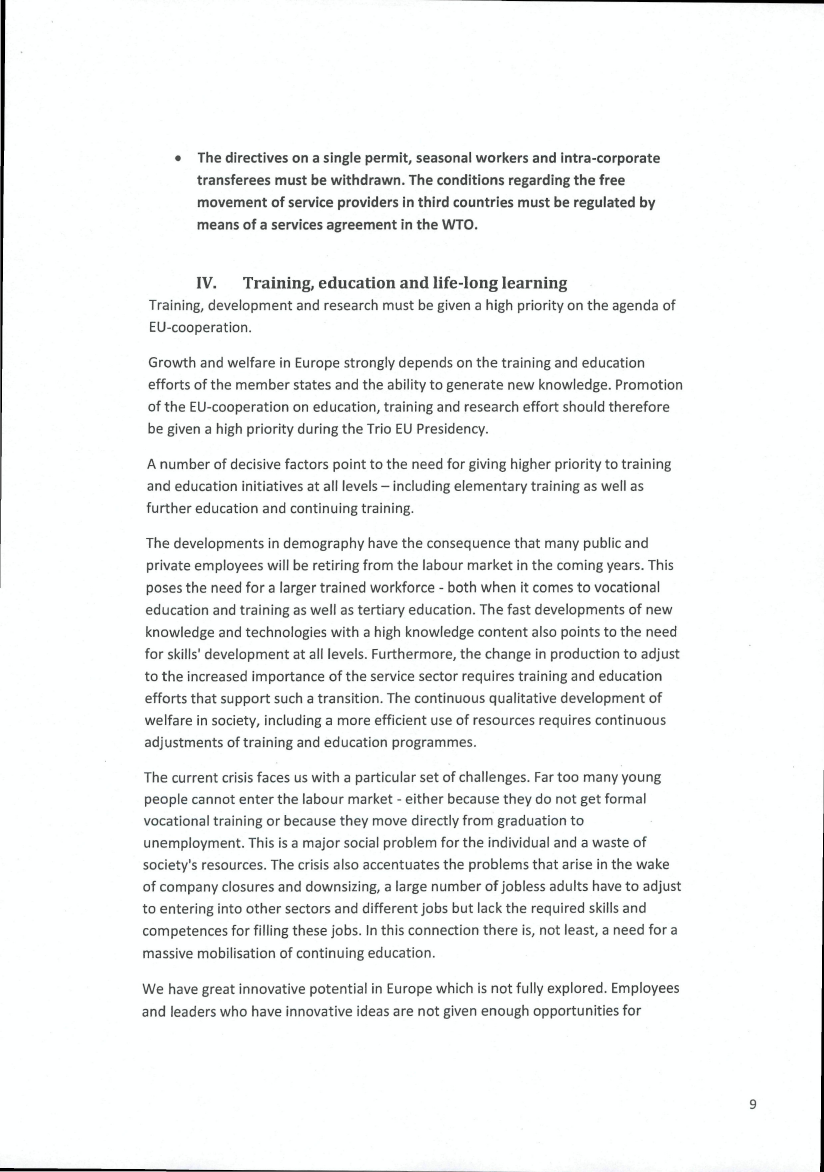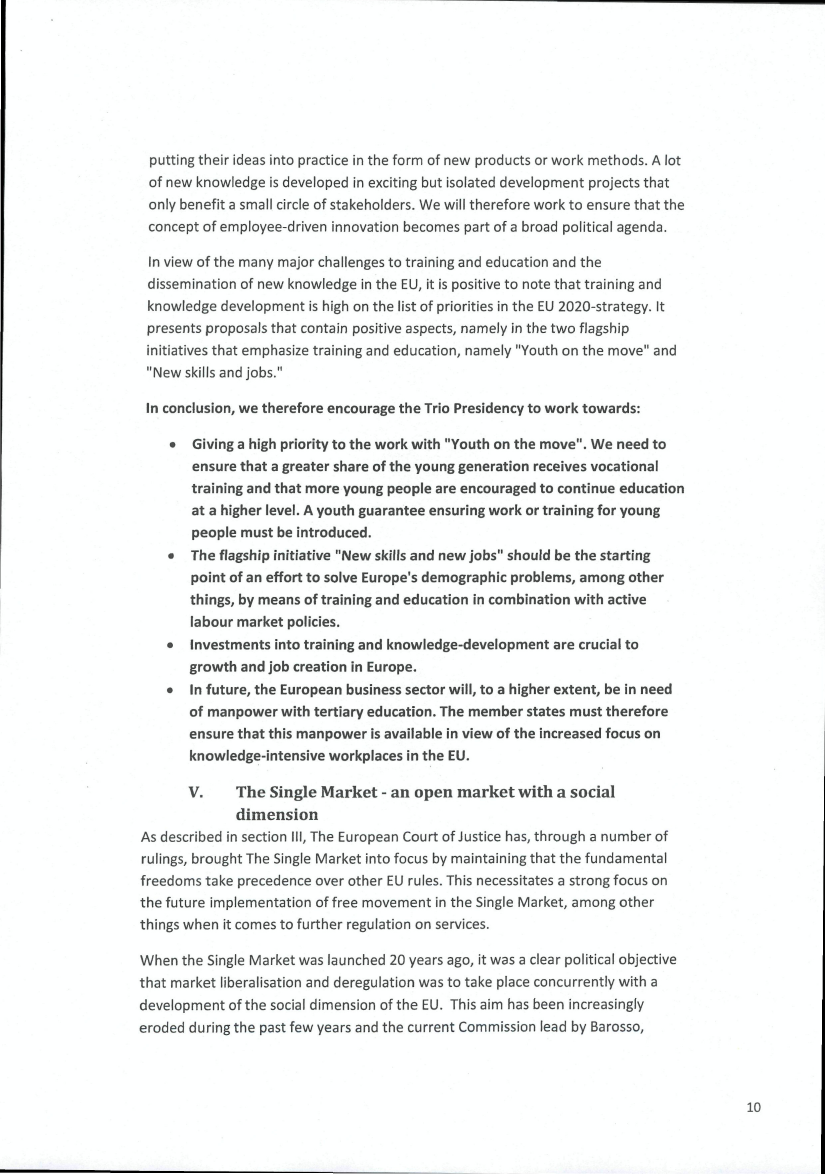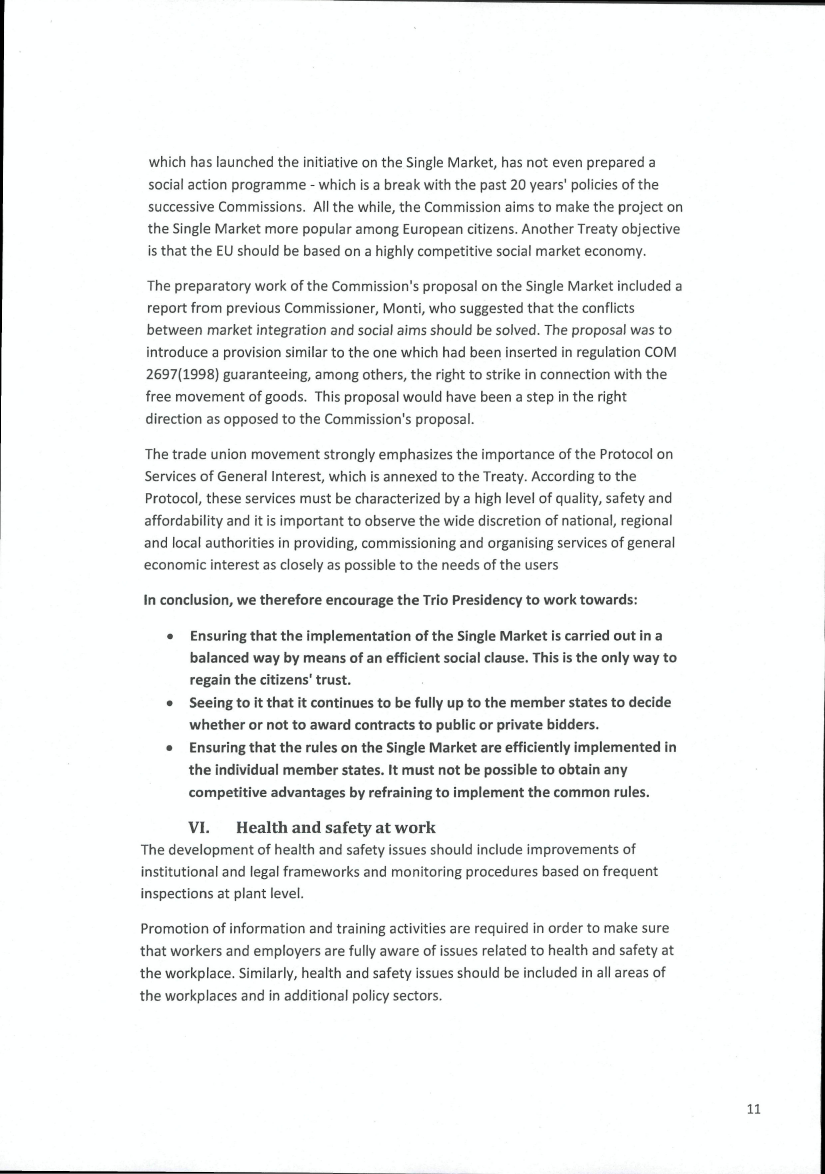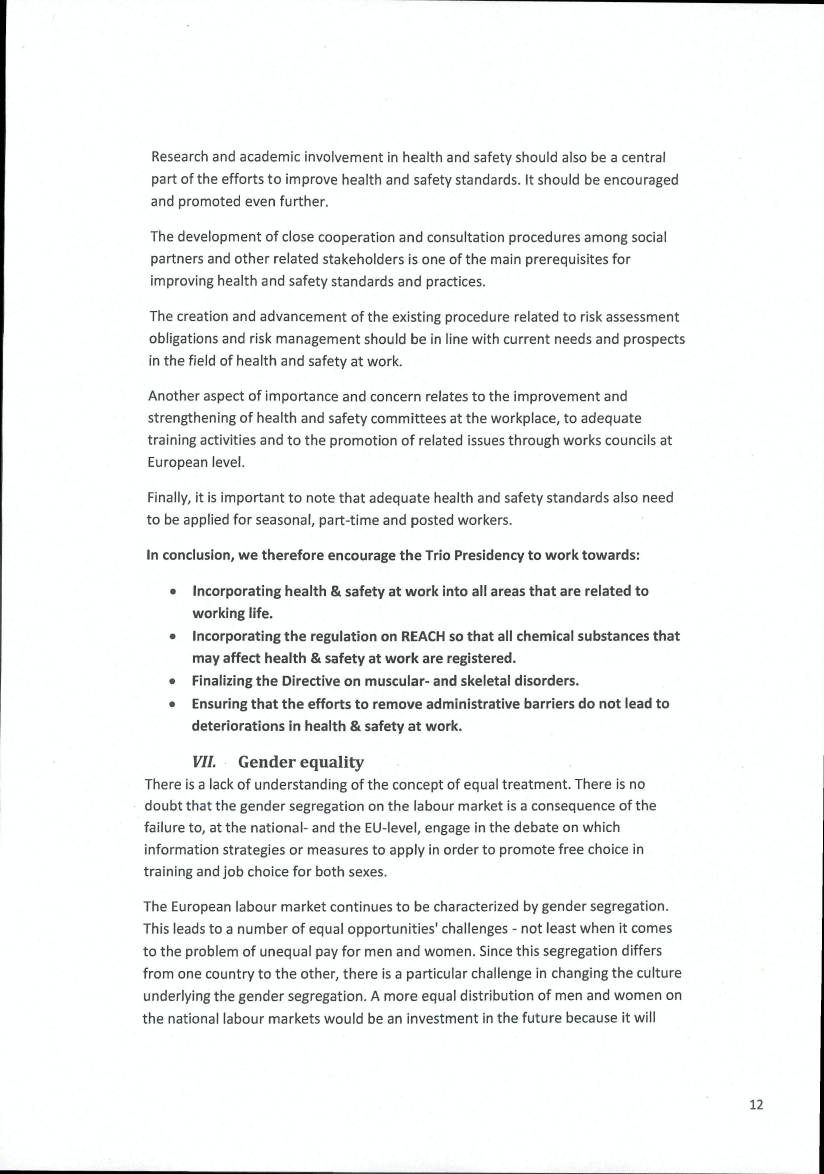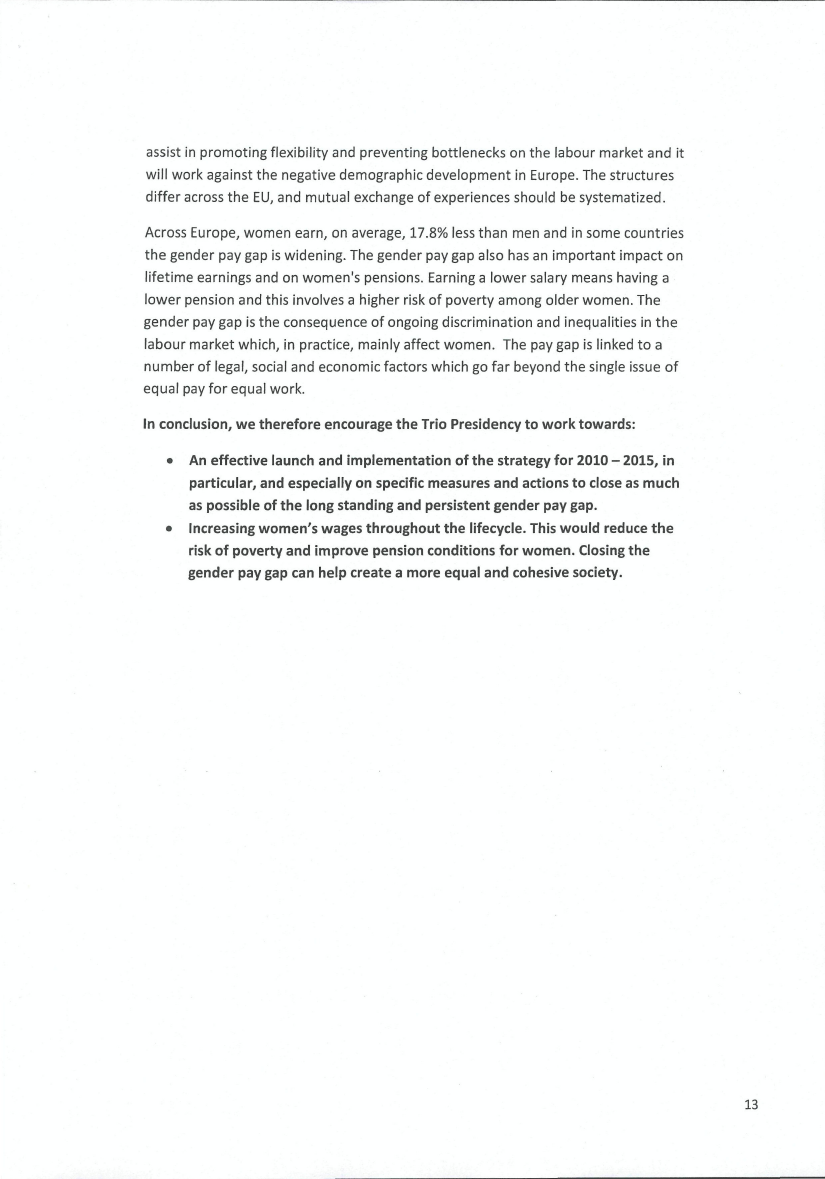Europaudvalget 2010-11 (1. samling)
EUU Alm.del Bilag 340
Offentligt
Folketingets Europa-udvalgFolketingetChristiansborg1240 København K
28.3.2011
FølgeskrivelseIfølge aftaleI henhold til telefonsamtale d.d.Til orienteringTil udtalelseTil godkendelseTil underskriftRing venligst herom på tlf.Tak for lånØnskes retur
Bemærkninger:Til uddeling til Folketingets Europa-udvalg vedlægges 80 stk. af LO's og FTF's brev og oplæg vedr. trioformand-skabet.
Charlotte Krogh NielsenChefsekretær3336 8805
FTF - Hovedorganisation for 450.000 offentligt og privat ansatteNiels Hemmingsens Gade 12 - Postboks 1169 - 1010 København KTlf: 33 36 88 00 - Fax 33 36 88 80 - E-mail: [email protected] - www.ftf.dk
15.3.2011
TrioformandskabDe faglige organisationer i Polen, Danmark og Cypern har i forbindelse med de tre landes kommende triofor-mandskab ønsket at fremsætte en række fælles forslag, som kan give inspiration til at finde løsninger på enrække områder, som vi mener, er centrale for den europæiske dagsorden.
Europa står overfor en række vigtige valg i den kommende periode. Valg som vil være afgørende for unionensborgere lang tid efter trioformandskabets afslutning.
Det er derfor meget vigtigt, at der nu træffes de beslutninger der rækker fremad og skaber ro om økonomienog får sat gang i beskæftigelsen samt sikrer den langsigtede bæredygtighed på arbejdsmarkederne. Samtidigmå EU gøre en aktiv indsats for at modvirke social dumping og styrke den sociale dimension for at sikre løn-modtagernes muligheder i det europæiske samarbejde.
Med dette oplæg til trioformandskaberne håber vi, at vi kan bidrage med belysning af nogle af de centraleemner i EU-politikken og kommer ligeledes med en række forslag til det videre arbejde.
Vi er selvfølgelig meget villige til at drøfte og uddybe disse forslag yderligere, hvis det skulle ønskes.
Venlig hilsen
Harald BørstingFormand LO
//
Bente SorgenfreyFormand FTF
Trio EU Presidency for the 2nd half of 2011 and for 2012Kick-start sustainable job creation in the EUIntroductionThe tråde union organisations from Poland, Denmark and Cyprus have, inconnection with their upcoming Trio EU Presidency, decided to put forward a set ofproposals that they recommend their respective countries to work with during thePresidency. As of 1 July 2011, the Trio Presidency will lead the meetings of theEuropean Union and will have ample opportunity for influencing Europeanlegislation.The three countries encourage their governments to work for solutions that willbenefit of all Citizens in the European Union. It is therefore necessary to focus oncreating economic growth and launch initiatives to increase the employment rate,among others by creating new sustainable workplaces.Europe is facing major new challenges, but we believe that it will be easier to obtaingood results if all 27 member states join in the efforts. We therefore encourage ourgovernments to spearhead the creation of constructive solutions to Europe'sproblems.The economic crisis has brought about major challenges. However, in the long term,Europe faces the challenge of setting up a framework for the transition to asustainable economy. The business sector must be further developed so that it cantake on a leading position on the world market in the face of competition fromnewly industrialized countries, such as China and India, by means of thedevelopment of products with a high knowledge-content. At the same time, theremust be a continuous development of welfare systems for European Citizens. Thisrequires a well-functioning public sector in order to create the framework conditionsfor a continuous development of growth and welfare.We are very willing to enter into a dialogue with the governments and our employercounterparts - both at the European and national levels - in order to bring about theconditions that are required if we are to ensure our vision of a fairer EU with equalconditions for everyone.
Signedby,i:I:
/!]
I
/ IAer
VhPiotrDudaPresidentNSZZSolidarnosc
JanGIKPresidentOPZZ /
Bente Sorgenfrey |PresidentFTF
Harald Børsting
PresidentLO-Denmark
)iomidousGeneral SecretaryDEOK
NicowyseosGeneral SecretarySEK
The tråde union movements of Denmark, Cyprus and Poland havethe following seven main priorities:I.The creation of growth and employment- the mainpriority in financial policy-making
a.) Sustainable financial policyThe economic crisis has led to considerable budget deficits in most EU memberstates - and thereby growing debt. There is a unilateral focus on reducing publicspending in order to reduce debt levels. There is no consideration of the faet thatwhen all EU member states practice budgetary austerity and cut jobs in the publicsector, this can be an impediment to economic growth. There is a need to point toother roads to long term budgetary stability than shrinking the welfare state andcutting down on social schemes.During the current economic crisis, one crucial issue has persisted, namely the lackof solidarity between the EU member states to fight the crisis by means of acoordinated politicai effort to defend the weaker countries. A rescue package shouldhave been introduced much sooner, sending a signal to the market that the EUmember states would stand together as one. In this way, the consequences of thecrisis would have been less severe for the most vulnerable countries.The current crisis is the result of financial speculation - especially in the form ofinvestments into dubious projects and securities carrying very high risks. ManyEuropean countries have been hit very hard and huge amounts of money have beenspent to save the banking and financial systems from complete collapse. The crisishas demonstrated a need for more efficient monitoring of financial institutions.Therefore, setting up the necessary control mechanisms for efficient monitoring ofthe financial sector should be an important priority for the Trio Presidency.In order to fight the consequences of the crisis and create new growth, the EU willneed increased financial resources for fighting the crisis. Introducing a financialtransaction tax could be a tool for providing additional sources of income providedthat it does not lead to rising unemployment.We have also witnessed how the crisis has accelerated a negative development onthe European labour market in the form of a growing number of precarious jobs.Many European workers feel that their job security is threatened. In a number ofcountries, the flexicurity concept has been misused as a pretext for increasingflexibility while leaving out the social safety measures and active labour marketpolicies that are fundamental elements in the flexicurity model.
When Europe is burdened with heavy government deficits as is the case now, itsmember countries need to step up their sources of income. Fiscai policy is a nationalmatter because each member country has the sovereign right to lead its own fiscaipolicy and thereby also the right to dispose of the state revenue. However,discussions on how best to apply the tax instruments at hånd at the European levelshould not be ruled out. The notion that tax relief for the rich will solve all economicdifficulties has not turned out to be the right solution. Taxes must be progressivesince the so-called flat taxes hit the poorest Citizens the hårdest. No one shouldexpect EU-funding to replace tax-financed contributions from the member states ifwe are to continue to develop the welfare system in the European societies.The role of European social dialogue should remain central in dealing with issuesrelated to economic and social governance. We propose the setting up of an 'EU2020' group in the framework of European Social Dialogue so that all 27 countriesand their social partners can be involved in ongoing policy discussions with the EUauthorities on a regular basis.In conclusion, we therefore encourage the Trio Presidency to work towards:•A targeting of the EU's financial perspectives from 2013 with a view tostrengthening growth and employment and creating greater cohesionbetween the EU-member countries.•The jobs that are created must carry a living wage and provide decentworking- and living conditions. This requires a major coordinated effort inorder to develop an active labour market policy.•The fight against precarious work offered to young people should be apriority. Specific efforts must be put into reducing youth unemployment,among other things, by ensuring that the young have access to vocationaltraining or tertiary education.•Funds must be provided in order to finance major infrastructure projectsand provide increased means for structural funds for the poorest membercountries. A financial transaction tax would be an instrument to reach thisobjective.
b) More and better jobs and decent workThe crisis has led to the creation of a great number of jobs that are characterized bypoor working conditions and reduced job security. This is not compatible with theEuropean social model. The Presidencies must therefore support and ensure a highlevel of job security in keeping with the principle of decent work as defined by theInternational Labour Organisation, ILO.
As a first priority, new jobs must be created as quickly as possible. Despite the crisis,millions of new jobs can be created in new sectors such as green technology orhealth care. This requires that both public and private investments are redirected tolabour intensive sectors using European and national reform programmes for jobcreation. At the same time, we have to ensure skills' upgrading for our workers sothat they are equipped for the jobs of the future. Europe should never attempt tocompete with emerging economies on the basis of low wages, low labour costs orpoor working conditions. It should, on the contrary, base its competitiveness on highskills, effectiveness, gender equality, productivity and innovation in a knowledge-driven economy. Active labour market policies must be stepped up to reduce thegender pay gap and to swiftly reintegrate recently laid-off workers and the long termunemployed on the labour market.The crisis has underlined the importance of strong, sustainable social protectionsystems. Many people's living conditions depend on the welfare state, which is whyreduced unemployment benefits, lower child care support and pension cuts arehaving very severe effects on society. Progressive action is now needed to tackle theincreasing pressure on the financial sustainability of national social security systems.Targeted policies must be established or reinforced to support those most affectedby the crisis, including those on the lowest incomes. It should be highlighted that theprecarious nature of employment creates difficult situations, not only for employeesthemselves, but also for the whole labour market and the regulated system ofindustrial relations. In some countries, the introduction of a national minimum wageis regarded as the core element of stability and social progress. A minimum wagesystem must, however, respect collective agreements contracted between workers'and employers' organizations. In countries with fragile or non-existing collectivebargaining systems, minimum wages could be introduced through legislationwithout undermining existing collective agreements.In conclusion, we therefore encourage the Trio Presidency to work towards:•••Active labour market policies, raising the level of workers' qualifications inorder to maintain their employability.Policies to improve the work-life balance.Fighting poverty actively in Europe.
//.
A just transition to a green economy based on alternativeenergy
The global climate situation necessitates a reorganisation of the supply of energyand the production methods in order to reduce the emission of C02 and in order toreduce the impact on the environment. It is however crucial that the target of
emission reduction is observed by all countries in all parts of the world. Otherwiseinstead of decreasing emission, jobs will be relocated to countries of low, non-sustainable standards and quite often also to tråde union free zones where corelabour standards are systematically violated. The EU must seek cooperation withother global players who expose nature to major environmental burdens with a viewto concluding binding climate agreements in order to contribute to the globalreduction of the environmental impact. It is vital that the interests of the poorestamong the developing countries are taken into due consideration with a view toensuring that their early-stage industrialisation is not brought to a standstill.At the same time, it is important that the transfer to climate-friendly production isbased on the principle of a fair transition and not on a system based on anti-competitive taxes and subsidies. A fair transition to a green economy requires theexistence of continuing training which makes it possible to adjust people'squalifications to the new conditions.The EU's structural funds must be organised in a way which supports the objectivesof the EU's climate policy and assists the member states in carrying out thetransition to a more environmentally friendly production. Poland, in particular,needs the assistance of the EU due to its large mining industry.A sustainable new deal should be focused and directed towards a just transition todecent, sustainable and green jobs as part of the global fight against climate change.In conclusion, we therefore encourage the Trio Presidency to work towards:•Progressive environmental policies and active efforts to ensure that Rio +20and COP17 become successes that address C02 reduction in all parts of theworld. The aim is the conclusion of a worldwide climate agreement.•The development of alternative energy sources such as solar and windenergy. This will generate innovation and workplaces in EuropeanIndustries.•A transition to a green economic policy and approach while securing theliving and working conditions of employees - especially those working inIndustries that can be regarded as non-friendly to the environment.•The adaptation to a low-energy consuming society must be based on theprinciple of making a just transition to decent jobs. The Structural fundsand The European Social Fund can contribute to financing the retrainingand readjustments necessary in companies - especially in the countries thatare most severely hit by the consequences of the changes.
III.
A social progress protocol linked to mobility and postingof workers
The recent ECJ decisions in the Laval and Viking cases have reinforced the superiorityof economic freedoms over fundamental social rights. The EU should introduce aSocial Progress Protocol in the EU Treaties in order to highlight the faet that the EUis not just an economic project but that it also includes, among its main objectives,the improvement of living and working conditions of its Citizens. The ETUC'sproposal for a social progress protocol is annexed to this programme as appendix 1.The right to take collective action is fundamental. Therefore, it should be secured inorder to protect workers' rights in accordance with the principles of ILO conventions87 and 98. This issue is of great importance, for instance when it comes tosafeguarding pay- and working conditions for posted workers.The role of workers and tråde unions should remain central in issues related to theimprovement of living and working conditions for workers, the fight against socialdumping and equal treatment of workers regardless of nationality or any othergrounds.When hearing labour market cases, the European Court of Justice should consultwith experts representing the social partners. And in the long term, an actualEuropean Labour Court should be established.In future, most EU member states will need to attrået foreign labour, particularlyskilied and highly qualified manpower. Increased mobility in Europe will therefore benecessary. If this area is to be developed, we cannot have a situation by which oneregion is characterized by unemployment and another region by a shortage oflabour. The Treaty and the Single Market support the free movement and rules havebeen set up regarding posted workers' conditions, including their right to healthcare. The EU should work to make sure that every member state has systematizedservices for citizens which offer them assistance for the formalities in connectionwith their relocation to another member state.Social dumping takes place in a number of areas. It can be in the form of companiesthat move their activities from a country with good wages and working conditions toa country with considerably poorer pay and working conditions or a country with apoorer enforcement of the existing obligations. In this connection, it is important toensure that the minimum regulation, which is laid down in EU-directives, must beenforced efficiently.The directive on the posting of workers is essential in order to achieve equaltreatment and protection of all workers and a level playing field for companies. This
is the most important guarantee against manipulation and abuse. It is thereforenecessary to ensure an efficient implementation of this protocol in all memberstates.In addition to this, special attention must be given to the legislative proposals of theEuropean Commission dealing with the conditions of entry and residence of third-country nationals. There are three proposed directives in this area, namely thedirectives on a single permit, seasonal work and intra-corporate transfers.It is unacceptable that after the four EG rulings, the Commission continues tolegislate with a view to liberalizing the single market, favouring unfair competition,undermining the equal treatment principle of different groups of workers and tryingto erode the host country principle. We need to follow the Lisbon Treaty's legalframework for ensuring a social market economy by demanding the Europeanlegislator to work for social progress and for the European Charter of FundamentalRights, ensuring both equal opportunities, non-discrimination, collective bargainingand the right to strike.The proposed directive on the posting of third country nationals should bedistinguished from the posting regulated by the directive on the posting of workersin the framework of the provision services, which concerns posting within the EU.Furthermore, it should be made clear that the inclusion of trainees in the postingprocess can be proved problematic since they are potentially very vulnerable toexploitation and abusive practices, which may also lead to unfair competition.In conclusion, we therefore encourage the Trio Presidency to work towards:•Incorporating a social clause in the treaties so that fundamental workers'rights are included on a par with the four fundamental principles of freemovement. If an inter-government conference is called with a view toincreasing the control of the member states' economies, this will lead tofurther austerity which will affect the workers negatively. A social clausewith be an appropriate safeguard for maintaining equality in Europe.•Putting an end to the uncertainty in connection with the directive on theposting of workers which has been interpreted by means of judicialdecisions by the European Court of Justice. This should be avoided by arecast of the directive with a view to clarifying it.•The underlying principle should be equal pay for work of equal valueregardless of the workers' country of origin. A minimum wage will notensure that the principle of equality is observed.
•
The directives on a single permit, seasonal workers and intra-corporatetransferees must be withdrawn. The conditions regarding the freemovement of service providers in third countries must be regulated bymeans of a services agreement in the WTO.
IV.
Training, education and life-long learning
Training, development and research must be given a high priority on the agenda ofEU-cooperation.Growth and welfare in Europe strongly depends on the training and educationefforts of the member states and the ability to generate new knowledge. Promotionof the EU-cooperation on education, training and research effort should thereforebe given a high priority during the Trio EU Presidency.A number of decisive factors point to the need for giving higher priority to trainingand education initiatives at all levels - including elementary training as well asfurther education and continuing training.The developments in demography have the consequence that many public andprivate employees will be retiring from the labour market in the coming years. Thisposes the need for a larger trained workforce - both when it comes to vocationaleducation and training as well as tertiary education. The fast developments of newknowledge and technologies with a high knowledge content also points to the needfor skills' development at all levels. Furthermore, the change in production to adjustto the increased importance of the service sector requires training and educationefforts that support such a transition. The continuous qualitative development ofwelfare in society, including a more efficient use of resources requires continuousadjustments of training and education programmes.The current crisis faces us with a particular set of challenges. Far too many youngpeople cannot enter the labour market - either because they do not get formalvocational training or because they move directly from graduation tounemployment. This is a major social problem for the individual and a waste ofsociety's resources. The crisis also accentuates the problems that arise in the wakeof company closures and downsizing, a large number of jobless adults have to adjustto entering into other sectors and different jobs but lack the required skills andcompetences for filling these jobs. In this connection there is, not least, a need for amassive mobilisation of continuing education.We have great innovative potential in Europe which is not fully explored. Employeesand leaders who have innovative ideas are not given enough opportunities for
putting their ideas into practice in the form of new products or work methods. A lotof new knowledge is developed in exciting but isolated development projects thatonly benefit a small circle of stakeholders. We will therefore work to ensure that theconcept of employee-driven innovation becomes part of a broad politicai agenda.In view of the many major challenges to training and education and thedissemination of new knowledge in the EU, it is positive to note that training andknowledge development is high on the list of priorities in the EU 2020-strategy. Itpresents proposals that contain positive aspects, namely in the two flagshipinitiatives that emphasize training and education, namely "Youth on the move" and"New skills and jobs."In conclusion, we therefore encourage the Trio Presidency to work towards:•Giving a high priority to the work with "Youth on the move". We need toensure that a greater share of the young generation receives vocationaltraining and that more young people are encouraged to continue educationat a higher levet. A youth guarantee ensuring work or training for youngpeople must be introduced.•The flagship initiative "New skills and new jobs" should be the startingpoint of an effort to solve Europe's demographic problems, among otherthings, by means of training and education in combination with activelabour market policies.••Investments into training and knowledge-development are crucial togrowth and job creation in Europe.In future, the European business sector will, to a higher extent, be in needof manpower with tertiary education. The member states must thereforeensure that this manpower is avaitable in view of the increased focus onknowledge-intensive workplaces in the EU.
V.
The Single Market - an open market with a socialdimension
As described in section III, The European Court of Justice has, through a number ofrulings, brought The Single Market into focus by maintaining that the fundamentalfreedoms take precedence over other EU rules. This necessitates a strong focus onthe future implementation of free movement in the Single Market, among otherthings when it comes to further regulation on services.When the Single Market was launched 20 years ago, it was a clear political objectivethat market liberalisation and deregulation was to take place concurrently with adevelopment of the social dimension of the EU. This aim has been increasinglyeroded during the past few years and the current Commission lead by Barosso,
10
which has launched the initiative on the Single Market, has not even prepared asocial action programme - which is a break with the past 20 years' policies of thesuccessive Commissions. All the while, the Commission aims to make the project onthe Single Market more popular among European Citizens. Another Treaty objectiveis that the EU should be based on a highly competitive social market economy.The preparatory work of the Commission's proposal on the Single Market included areport from previous Commissioner, Monti, who suggested that the conflictsbetween market integration and social aims should be solved. The proposal was tointroduce a provision similar to the one which had been inserted in regulation COM2697(1998) guaranteeing, among others, the right to strike in connection with thefree movement of goods. This proposal would have been a step in the rightdirection as opposed to the Commission's proposal.The tråde union movement strongly emphasizes the importance of the Protocol onServices of General Interest, which is annexed to the Treaty. According to theProtocol, these services must be characterized by a high level of quality, safety andaffordability and it is important to observe the wide discretion of national, regionaland local authorities in providing, commissioning and organising services of generaleconomic interest as closely as possible to the needs of the usersIn conclusion, we therefore encourage the Trio Presidency to work towards:•Ensuring that the implementation of the Single Market is carried out in abalanced way by means of an efficient social clause. This is the only way toregain the Citizens' trust.••Seeing to it that it continues to be fully up to the member states to decidewhether or not to award contracts to public or private bidders.Ensuring that the rules on the Single Market are efficiently implemented inthe individual member states. it must not be possible to obtain anycompetitive advantages by refrainingto implement the common rules.
VI.
Health and safety at work
The development of health and safety issues should include improvements ofinstitutional and legal frameworks and monitoring procedures based on frequentinspections at plant level.Promotion of information and training activities are required in order to make surethat workers and employers are fully aware of issues related to health and safety atthe workplace. Similarly, health and safety issues should be included in all areas ofthe workplaces and in additional policy sectors.
11
Research and academic involvement in health and safety should also be a centralpart of the efforts to improve health and safety standards. It should be encouragedand promoted even further.The development of close cooperation and consultation procedures among socialpartners and other related stakeholders is one of the main prerequisites forimproving health and safety standards and practices.The creation and advancement of the existing procedure related to risk assessmentobligations and risk management should be in line with current needs and prospectsin the field of health and safety at work.Another aspect of importance and concern relates to the improvement andstrengthening of health and safety committees at the workplace, to adequatetraining activities and to the promotion of related issues through works councils atEuropean level.Finally, it is important to note that adequate health and safety standards also needto be applied for seasonal, part-time and posted workers.In conclusion, we therefore encourage the Trio Presidency to work towards:••••Incorporating health & safety at work into all areas that are related toworking life.Incorporating the regulation on REACH so that all chemical substances thatmay affect health & safety at work are registered.Finalizing the Directive on muscular- and skeletal disorders.Ensuring that the efforts to remove administrative barriers do not lead todeteriorations in health & safety at work.
VIL
Gender equality
There is a lack of understanding of the concept of equal treatment. There is nodoubt that the gender segregation on the labour market is a consequence of thefailure to, at the national- and the EU-level, engage in the debate on whichinformation strategies or measures to apply in order to promote free choice intraining and job choice for both sexes.The European labour market continues to be characterized by gender segregation.This leads to a number of equal opportunities' challenges - not least when it comesto the problem of unequal pay for men and women. Since this segregation differsfrom one country to the other, there is a particular challenge in changing the cultureunderlying the gender segregation. A more equal distribution of men and women onthe national labour markets would be an investment in the future because it will
12
assist in promoting flexibility and preventing bottlenecks on the labour market and itwill work against the negative demographic development in Europe. The structuresdiffer across the EU, and mutual exchange of experiences should be systematized.Across Europe, women earn, on average, 17.8% less than men and in some countriesthe gender pay gap is widening. The gender pay gap also has an important impact onlifetime earnings and on women's pensions. Earning a lower salary means having alower pension and this involves a higher risk of poverty among older women. Thegender pay gap is the consequence of ongoing discrimination and inequalities in thelabour market which, in practice, mainly affect women. The pay gap is linked to anumber of legal, social and economic factors which go far beyond the single issue ofequal pay for equal work.In conclusion, we therefore encourage the Trio Presidency to work towards:•An effective launch and implementation of the strategy for 2010 - 2015, inparticular, and especially on specific measures and actions to close as muchas possible of the long standing and persistent gender pay gap.•Increasing women's wages throughout the lifecycle. This would reduce therisk of poverty and improve pension conditions for women. Closing thegender pay gap can help create a more equal and cohesive society.
13
